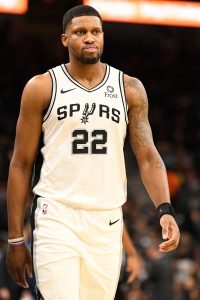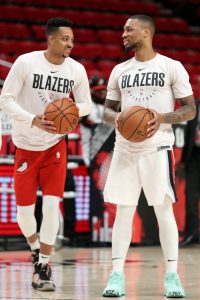Most of 2019’s offseason signees became eligible to be traded over the weekend. However, while most players on NBA contracts can now be dealt, there are still a handful of players who remain ineligible to be traded — at least for now.
Here’s a breakdown of the players still facing trade restrictions:
Players who met the January 15 criteria:
Not every player who signed a free agent contract in the offseason had their trade restrictions lifted on December 15. For a select handful of players, that date will be January 15 instead.
These players all meet a specific set of criteria: Not only did they re-sign with their previous team this offseason, but they got a raise of at least 20%, their salary is worth more than the minimum, and their team was over the cap, using Bird or Early Bird rights to sign them.
The following players meet this criteria and will become trade-eligible on January 15:
- Ryan Arcidiacono (Bulls)
- Patrick Beverley (Clippers)
- Khem Birch (Magic)

- Thomas Bryant (Wizards)
- Alex Caruso (Lakers)
- Dorian Finney-Smith (Mavericks)
- Rudy Gay (Spurs)
- Tobias Harris (Sixers)
- Maxi Kleber (Mavericks)
- Kevon Looney (Warriors)
- Rodney McGruder (Clippers)
- Khris Middleton (Bucks)
- Darius Miller (Pelicans)
- Nene (Rockets)
- Kelly Oubre (Suns)
- Kristaps Porzingis (Mavericks)
- Daniel Theis (Celtics)
- Klay Thompson (Warriors)
- Nikola Vucevic (Magic)
- Ivica Zubac (Clippers)
Players who signed as free agents after September 15:
Technically, the NBA’s Collective Bargaining Agreement states that a player who signs a free agent contract can’t be traded for three months or until December 15, whichever comes later. Most big-name free agents sign new contracts in July, so we default to December 15 in those cases. That’s not the case for everyone though, as the three-month rule applies to any player who signs after September 15.
Here are the players who signed after September 15 and remain on NBA rosters, along with the dates they’ll become trade-eligible:
- Vince Carter (Hawks): December 20
- Thabo Sefolosha (Rockets): December 23
- Marquese Chriss (Warriors): December 30
- Caleb Martin (Hornets): January 19
- Jalen McDaniels (Hornets): January 20
- Wenyen Gabriel (Kings): January 21
- Amile Jefferson (Magic): February 1
Of course, since this season’s trade deadline falls on February 6, players who signed their contracts after November 6 won’t be trade-eligible at all until after the season. The following players fit that bill as of today:
- Carmelo Anthony (Trail Blazers)
- Juwan Morgan (Jazz)
Players who recently signed veteran contract extensions:
When a player signs a veteran contract extension that exceeds the NBA’s extend-and-trade rules – which are fairly restrictive – he can’t be traded for six months.
As our extension tracker shows, nine veteran extensions have been signed so far in 2019/20. Of those nine, only one – Kyle Lowry‘s – didn’t exceed the league’s extend-and-trade rules. Of the other eight, three were signed prior to August 6, meaning those players will become trade-eligible by February 6.
Here are the trade-eligible dates for those players:
- Dwight Powell (Mavericks): January 6

- CJ McCollum (Trail Blazers): January 30
- Draymond Green (Warriors): February 3
The following players who signed extensions can’t be dealt at all this season, either because they signed their extensions after August 6 or because they signed a super-max extension.
- Eric Gordon (Rockets)
- Bradley Beal (Wizards)
- Joe Ingles (Jazz)
- Cedi Osman (Cavaliers)
- Damian Lillard (Trail Blazers)
- Note: Lillard is ineligible to be traded for one year because he signed a super-max extension.
Players who can be dealt — with caveats:
The players in this group can technically be traded, so we won’t list them all. However, a variety of potential roadblocks may impact whether or not it’s actually realistic to move them this season. Here’s the breakdown:
- Players whose contracts meet certain criteria have the ability to block trades that involve them. Here’s the full list of 16 players who have that veto ability in 2019/20, including Lakers veterans Kentavious Caldwell-Pope, JaVale McGee, and Rajon Rondo.
- Players who have trade kickers in their contracts will receive bonuses if they’re traded, which can complicate some potential deals financially. The 23 players with trade kickers in their contracts, including Steven Adams and LaMarcus Aldridge, are listed here.
- A player can’t be aggregated with another player for salary-matching purposes if he has been traded to an over-the-cap team within the last two months. That restriction doesn’t apply to anyone right now, but any player traded between now and February 6 won’t be eligible to be aggregated in a second deal before the deadline.
- The “poison pill provision” applies to players who signed rookie scale extensions that will begin the following season. The poison pill provision, which we outline in greater detail in a glossary entry, can make salary-matching very difficult in trades. It currently affects nine players, including Ben Simmons and Jamal Murray.
- If a team traded a player to another team during the 2019 offseason, it can’t re-acquire that player from that team again during the season. For instance, after acquiring him from Golden State in July, the Grizzlies couldn’t trade Andre Iguodala back to the Warriors this season. This rule applies to any trade consummated since the end of the NBA Finals.
Photos courtesy of USA Today Sports Images.
